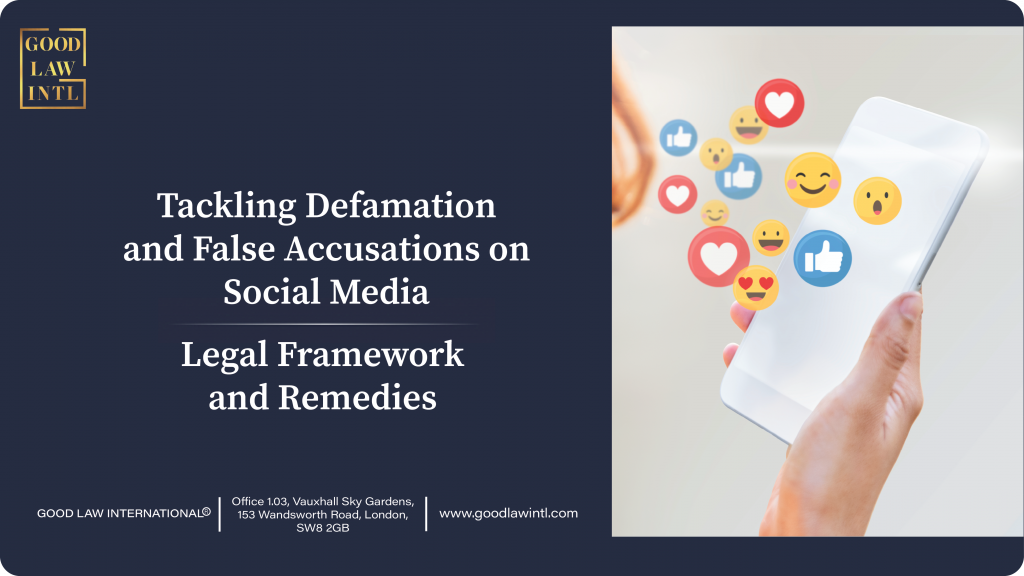
Tackling Defamation and False Accusations on
Social Media: Legal Framework and Remedies

Omar Khattab
International Associate
In today’s digital-first world, reputations can be significantly affected by posts, tweets, and reviews – sometimes unjustly so. Social media platforms empower individuals to broadcast opinions and accusations that, if false, may cross into the territory of defamation, libel, or malicious falsehood.
This article explores the legal framework for handling such situations, and what remedies are available for those targeted by damaging online content.
Legal Framework:
The cornerstone of modern defamation law in England and Wales is the Defamation Act 2013.
Key Requirements to Bring a Claim (Defamation Act 2013, s.1):
- The statement must have caused serious harm to the claimant’s reputation.
- For businesses, serious harm is established only if it causes serious financial loss.
- The statement must refer to the claimant, and have been published to a third party.
Unlike slander (spoken), libel covers written or published statements—including those on social media.
Defenses to Defamation:
The Defamation Act 2013 also outlines defenses that may apply (Sections 2–5):
| Defense | Explanation |
| Truth (s.2) | The statement is substantially true. |
| Honest Opinion (s.3) | A statement of opinion, based on facts, that an honest person could hold. |
| Public Interest (s.4) | Publication was in the public interest and the publisher reasonably believed it to be so. |
| Website Operator Defense (s.5) | Operators of websites are protected if they act promptly after notice of unlawful content. |
Remedies Available:
Where defamation is established and no defence applies, the claimant can seek the following:
1. Cease and Desist Letter
Solicitors often begin with a formal letter demanding:
- Removal of the offending post;
- A public apology;
- An undertaking not to repeat the statement.
This is often sufficient to resolve the issue swiftly and privately.
2. Platform Reporting
Most major platforms (e.g. Facebook, Instagram, Trustpilot, X) have systems to report:
- Harmful or false content;
- Breaches of community guidelines or terms of service.
While these platforms benefit from a “safe harbour” under the E-Commerce Regulations 2002 (Regulation 19), they can lose protection if they fail to act once notified.
3. Legal Action in Court
Where informal steps fail, court action may be appropriate. Potential outcomes include:
- Damages: To compensate for reputational or financial harm.
- Injunctions: To prevent further publication.
- Declaration of falsity: To set the public record straight.
- Costs orders: Though litigation can be expensive and attract further publicity.
> Limitation Period: One year from the date of publication (Limitation Act 1980, s.4A).
Notable UK Cases:
Monroe v Hopkins [2017] EWHC 433 (QB)
Katie Hopkins was found to have libelled Jack Monroe on Twitter, falsely linking them to vandalism of war memorials. The High Court awarded £24,000 in damages.
Key takeaway: Even a single tweet can be actionable if it causes serious reputational harm.
Stocker v Stocker [2019] UKSC 17
The Supreme Court ruled that social media comments should be interpreted as an ordinary reader would understand them, rather than through forensic legal parsing.
Key takeaway: Context and tone on social media matter.
Brett Wilson LLP v Persons Unknown [2015] EWHC 2628 (QB)
Law firm Brett Wilson successfully brought proceedings against anonymous users who left defamatory reviews on Google, securing an injunction and damages.
Resolution Strategies:
| Step | Action |
| 1 | Record the content (screenshots, links, dates). |
| 2 | Assess harm to reputation and finances. |
| 3 | Contact the platform or poster to request removal. |
| 4 | Instruct a solicitor to issue a legal notice. |
| 5 | If needed, issue proceedings or explore mediation. |
Conclusion
Online defamation – whether through a tweet, blog post, or anonymous review – can cause significant personal and professional damage. Fortunately, UK law provides robust remedies to address these issues. The best outcomes are often achieved by combining legal action with reputation management strategies and swift digital response.
Sources & References:
- Defamation Act 2013: https://www.legislation.gov.uk/ukpga/2013/26/contents
- Electronic Commerce (EC Directive) Regulations 2002: https://www.legislation.gov.uk/uksi/2002/2013/contents/made
- Monroe v Hopkins [2017] EWHC 433 (QB): https://www.bailii.org/ew/cases/EWHC/QB/2017/433.html
- Stocker v Stocker [2019] UKSC 17: https://www.supremecourt.uk/cases/docs/uksc-2018-0045-judgment.pdf
- Brett Wilson LLP v Persons Unknown [2015] EWHC 2628 (QB): https://www.bailii.org/ew/cases/EWHC/QB/2015/2628.html
For specialist advice and support. Please get in touch with our corporate solicitors in London by contacting the GOOD LAW INTL office.
A warm welcome to GOOD LAW INTL. To learn more about us and our practice areas, we invite you to browse through our website and contact us or book an appointment.



